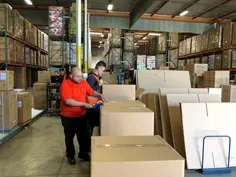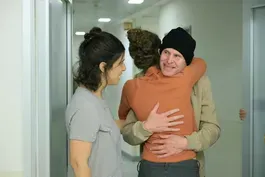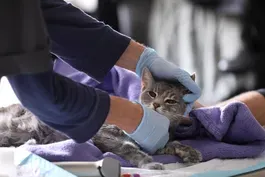
Former FAA administrator discusses state of aviation safety
Clip: 2/1/2025 | 5m 41sVideo has Closed Captions
Former FAA administrator discusses the current state of aviation safety
There’s been another fatal plane crash, this one in Philadelphia, as officials are still investigating Wednesday’s deadly mid-air collision in Washington, D.C. that claimed 67 lives. Randy Babbitt, a former FAA administrator and commercial airline pilot, joins John Yang to discuss the search for answers and the state of aviation safety.
Major corporate funding for the PBS News Hour is provided by BDO, BNSF, Consumer Cellular, American Cruise Lines, and Raymond James. Funding for the PBS NewsHour Weekend is provided by...

Former FAA administrator discusses state of aviation safety
Clip: 2/1/2025 | 5m 41sVideo has Closed Captions
There’s been another fatal plane crash, this one in Philadelphia, as officials are still investigating Wednesday’s deadly mid-air collision in Washington, D.C. that claimed 67 lives. Randy Babbitt, a former FAA administrator and commercial airline pilot, joins John Yang to discuss the search for answers and the state of aviation safety.
How to Watch PBS News Hour
PBS News Hour is available to stream on pbs.org and the free PBS App, available on iPhone, Apple TV, Android TV, Android smartphones, Amazon Fire TV, Amazon Fire Tablet, Roku, Samsung Smart TV, and Vizio.
Providing Support for PBS.org
Learn Moreabout PBS online sponsorshipJOHN YANG: Good evening.
I'm John Yang.
There's been another fatal plane crash, this one in Philadelphia, even as investigators piece together evidence from Wednesday's deadly mid-air collision in Washington, DC.
Last night, a small jet transporting a pediatric patient home to Mexico crashed in Northeast Philadelphia shortly after takeoff.
At least seven people died, including the six Mexican citizens on board.
On the ground, homes were set ablaze and at least 19 people were injured.
It came as investigators continue their search for answers in the collision of a passenger jet and an army helicopter near Washington's airport.
That accident claimed 67 lives, the worst U.S. air crash in at least 15 years.
Randy Babbitt is a former administrator of the Federal Aviation Administration and he's also a former commercial pilot.
Mr. Babbitt, the FAA took its first step, its first action yesterday.
They closed off the area around Washington, Reagan national to low altitude most low altitude helicopter traffic.
What do you think of that?
RANDY BABBITT, Former Administrator, Federal Aviation Administration: I think it's a good move.
I think it was an important move.
There's other ways they can move the aircraft around and let's get to the bottom of what happened to this one before we reinstate that type of routing.
JOHN YANG: You say reinstate, would you want to see that made permanent or do you think it's just a pause is fine?
RANDY BABBITT: Well, I think until they determine the actual anything we say would be speculation.
But I think the safe thing to do is what they did, and that is just suspend the traffic for no harm done.
It's not like they're grounding them.
They can go other ways.
It's just they don't want them in that area until we understand, have we got the right controls and safety parameters in place to allow traffic to do that?
If the answer is no, then they'll have to design another route.
JOHN YANG: Now that the NTSB investigators have black boxes from both the helicopter and the passenger jet and they say they're confident they can get good data from it, are you confident that they're going to get to the bottom of this?
RANDY BABBITT: Oh, yes, I am.
Now, it's not going to be quickly.
The NTSB is a very diligent operation.
They're assisted to the extent they wish to be by the FAA.
They'll do a thorough investigation, recreate everything.
I mean, they're going to look at the machine, they're going to look at the weather, they're going to look at the people, everything involved.
And yes, they'll come up with a good answer.
And, you know, the probable cause and the contributing factors.
You know, the pilots, for example, in the helicopter were wearing night goggles.
Was that helping or hurting?
We don't know.
Goggles become quite restrictive to your peripheral vision as opposed to the, you know, the full cockpit of a helicopter is a lot of glass and you see everything.
And you put those goggles on, you narrow down what you can see, and that may be a contributing factor.
JOHN YANG: Actually, I think the Pentagon is saying that they're still trying to figure that out if they were wearing night goggles.
But I want to ask you served in the Obama administration.
What did you think when you heard President Trump talk about the diversity efforts, the diversity programs that went back to the Obama administration and suggested it's made air traffic less safe?
RANDY BABBITT: I thought it was a grossly misstated words, nowhere near the facts.
To be an air traffic controller is a rigorous, the hiring, screening and then the school.
They wash out about 30 percent of those who enter the 70 percent.
It's about a two year program before they're actually going to control aircraft.
And to even suggest that there's anything but the best and brightest out there, it's a tough job.
They do it well.
Remember, at any given moment there's 7,000 airplanes in the air over this country and they're being controlled by aircraft controllers in coordination with the pilots.
So to suggest anything different, in my opinion, was just horribly misleading.
JOHN YANG: For years now, the NTSB and the FAA have been talking a lot about close calls, near misses they're called.
Do you think this tragedy is going to spark a rethinking of the larger air traffic system, the safety of it, the role of controllers and that sort of thing?
RANDY BABBITT: Well, we certainly, I mean, you can always look for improvements, that's for sure.
But let's not lose sight of the fact that it's been 12 years.
We move, what is it, 90 million people a year without incident.
We kill 38,000 people a year on the highways and we've killed no one in an airplane.
So it's a remarkably safe system.
Nevertheless, it's a tragedy and I feel it was horrible when you see what happened.
But to suggest that the system isn't safe is really not looking at the facts.
Can it better?
Of course.
Will we learn from this?
I think we will.
JOHN YANG: There's also been a lot of talk about Reagan National.
It's tight.
It's got only one main Runway.
It's right up against the Washington D.C. What can be done to make Reagan national safer?
RANDY BABBITT: Well, let's start with the fact it's a pretty safe airport.
As a commercial pilot, I was based here, so I made as many takeoffs and landings at a national airport as probably anybody you're going to talk to.
There's a finite limitation with the, you know, the long runway for the bigger aircraft and the amount of traffic you can put in there.
And then so to suggest that we should, you know, add more flights, maybe we should think about the other direction.
Maybe we should think about tapering off a little bit, maybe spread those flights out.
Everybody wants to fly at the peak hours.
Maybe we say, not everybody can fly at the peak.
Let's spread that out so we have an even flow of traffic through the day, which would be a step to look at.
JOHN YANG: Randy Babbitt, thanks very much for your thoughts and your expertise.
RANDY BABBITT: You're sure.
Welcome.
Thank you.
How Trump’s tariffs affect America’s biggest trade partners
Video has Closed Captions
What Trump’s tariffs could mean for America’s biggest trade partners and U.S. consumers (4m 55s)
News Wrap: Israel, Hamas complete 4th exchange of ceasefire
Video has Closed Captions
News Wrap: Israel, Hamas complete 4th prisoner-hostage exchange of ceasefire deal (2m 41s)
Why many veterinarians suffer mental health challenges
Video has Closed Captions
How vet schools are trying to address the mental health challenges plaguing veterinarians (9m 54s)
Providing Support for PBS.org
Learn Moreabout PBS online sponsorshipMajor corporate funding for the PBS News Hour is provided by BDO, BNSF, Consumer Cellular, American Cruise Lines, and Raymond James. Funding for the PBS NewsHour Weekend is provided by...















